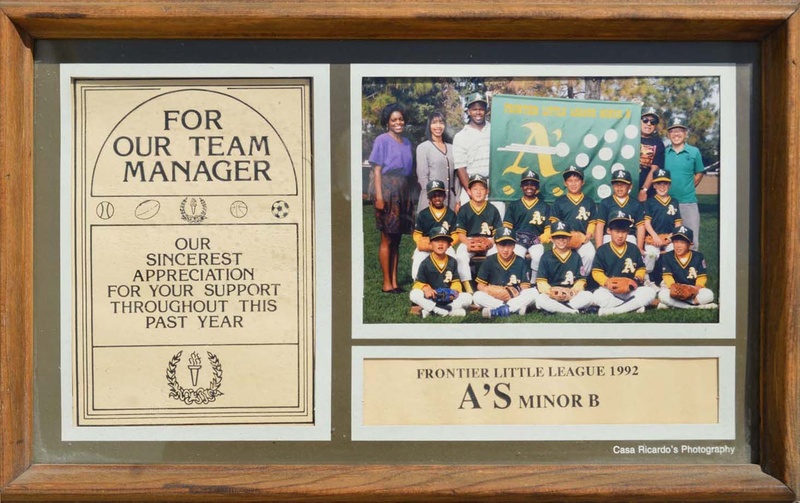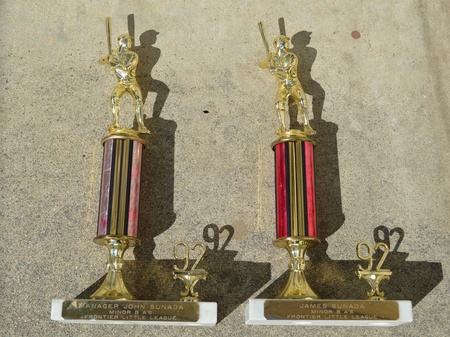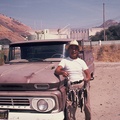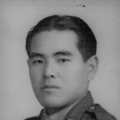My first exposure to baseball was around 1959 when my parents signed me up for baseball through the Fresno Buddhist Church which sponsored youth athletic sports such as baseball. This form of church “Little League” consisted of teams from various churches, both Buddhist and Christian throughout the area. The teams were made up of Japanese American (Sansei) teens, ages 11 to 12, with a maximum of 12 players. I knew most of them from church and they lived in the city of Fresno and its suburbs. I was the lone outcast from the rural portion (Inaka) of Fresno. I never was fully accepted by my teammates, maybe because I was such a poor player or because I was country hick, hayseed, or bumpkin!
My fielding skills were lacking for I always played right field, which was usually reserved for the worst player on the team because few balls were hit in that direction. My coach never gave me directions on how to catch fly balls, so I ran towards the fly ball, but the ball usually landed 20 feet behind me! I realized much later that I should back up first until I can see where the ball will fall in front. I should then run towards the ball, for its far easier to catch the ball this way. I always hoped that no fly balls would come my way, but luck would have it that someone would hit a fly ball to me, and I always failed to catch it!
On offense, I was no better. During practice, the coach never taught me how to bat, just to swing the bat! When it came to my turn at bat, I just wanted to get on base on four balls. As luck would have it, I always struck out looking (meaning I struck out without swinging the bat). I don’t remember ever if my teammates offered advice, just criticism.
Then on the last game of the season, I was determined to get a hit. So, on my turn at bat, I swung the bat with my eyes closed! Surprising, I made contact and the ball dribbled down third base line. It was more of a bunt, and I had good speed and beat the throw to first base. Yeah, I got my first and only hit! The next batter was a good athlete and managed to hit a home run, driving in me and himself to win the game! I was thrilled with the results but my teammates, once the excitement wore off, they still did not include me into their group. Baseball was not a rewarding or enjoyable experience for me!
Years later in 1992, I was asked to coach a Little League team that my son was on. I knew nothing of coaching, but the league needed a father to help out. So, I accepted the position. My team was the Minor B Athletics, with 12 boys, ages 9 to 10. They were a diverse group, consisting of Asians, Hispanics, African Americans, and Caucasians. Since I was a novice, I asked a dad to help me when he could which was infrequent so it was usually me and on occasion, my wife teaching the kids. I checked out books on coaching from the library and recalled my experiences from my childhood and baseball. I remembered my memories of my little league days and I did not have a good time.
I noticed how some coaches became so focused on winning and nothing else. I did not believe that winning is everything and told my players that the purpose of them playing baseball was to have fun and to develop teamwork. If they were not having fun, then I was not doing my job! I had to remind myself that these kids were here to have fun and some of them may not even like baseball!
Also, I did not want anyone on the team to criticize one of their teammates for poor playing. Instead I encouraged them to offer advice on how to improve their playing skills. I stressed the fact that the team won or lost as a team. That one could not rely on one player to score all the runs or strike out all the opposing players. I gave the example of my little league experience where I got on base and my teammate drove both of us on a home run to win the game. So, it takes teamwork on both offense and defense to win games.
After losing a few games, I realized coaching was not easy. Following a lost game, I asked my players what did we need to do, to which they replied “more practice.” I then told them I would see them at practice. The players showed up next day at a local elementary school which had a baseball diamond and practiced their hearts out. They sharpened their defensive skills at fielding by backing up for fly balls, coordinating put-outs (one player throws a hit ball to another player for the out) and double plays. On offense, I instructed my players to follow the ball as it left the pitcher’s hand, never close your eyes and try to meet the ball with the bat. I told them it’s better to strike out swinging than to strike out looking. Soon we began to win games! But again, I did not want to stress that winning was everything. I told my boys that when you do your best, winning will come and to never give up.
The Division we were in was the Minor B Division with four teams, the Cardinals, Padres, Phillies, and the Athletics. The Cardinals was the team to beat for they were undefeated all season. But there were two games that were quite memorable. The first game was when the Cardinals were leading in the 4th inning by a score of 18 to 0 and the opposing coach asked if we wanted to call it quits. I returned to our dugout and asked the players what they wanted to do. I said I didn’t want to give up and wanted to play even though we would lose. I added that some of you may hit a home run or improve your batting average or sharpen their defensive skills. My team all shouted they wanted to play the complete game! Well, we still lost the game but two of the boys hit home runs and improved our score to 18 to 3!
The same Cardinals by the next game had a low opinion of us. I told my players to do their best and to have fun. As the game progressed, the lead changed almost every inning and when the game was over, the Cardinals won but just barely, 15 to 13! When it came to congratulate the other team, the Cardinals complemented our players for playing so well! Afterward, I told my team that even though we lost the game, we won their respect!
At the end of the season, our team, the Minor B Athletics had a record of 7 wins and 9 losses. I felt proud of my team and their accomplishments. Another surprise was that 6 of the 12 players (including my son) were drafted by Major Division teams instead of the Minor A Division teams.
At the team pizza party, I presented certificates of accomplishment to each player for something they excelled in (i.e. home runs, most hits, most RBI, etc.) I enjoyed immensely my time as a Little League coach and teaching the boys something about teamwork, of never giving up, doing your very best and to never accept failure but to get back up and try again and to never give up on yourself! If you do these things, you can be proud of yourself, for you are a winner.
I hoped I taught the boys somethings useful in life, such as working together, patience, and determination. But as my team found out, winning is much more fun!
© 2020 John Sunada







